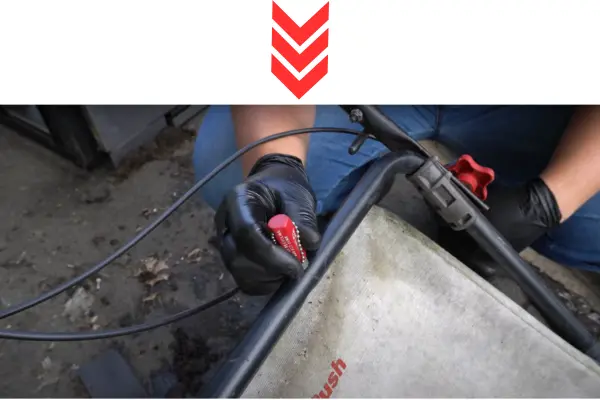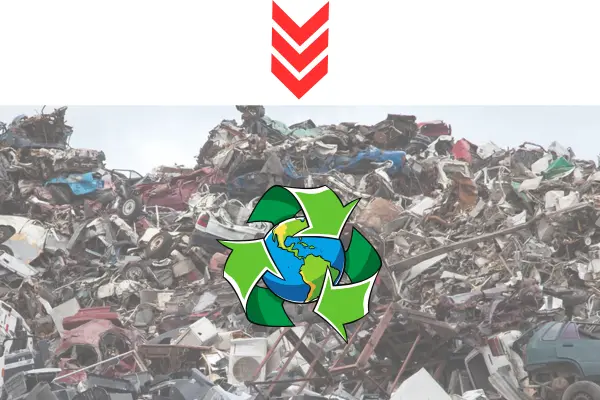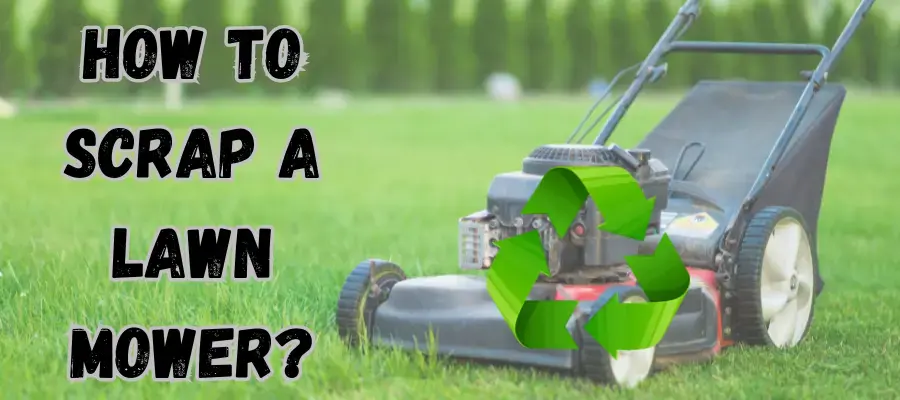Scrapping a lawn mower might not seem like a typical DIY project, but with the right knowledge and tools, it can be a lucrative endeavor.
Whether you’re looking to make some extra cash or simply want to responsibly dispose of an old lawn mower, understanding the scrapping process is essential.
In this guide, we’ll take you through How to Scrap a Lawn Mower, from identifying valuable materials to maximizing your earnings at the scrap yard.
📌Understanding the Materials

Before you begin dismantling your lawn mower, it’s important to understand the materials you’ll encounter and which ones hold value.
One of the simplest ways to identify valuable metals is by using a magnet. Steel components, such as the handle, are attracted to the magnet, while aluminum parts, like the engine, are not.
In addition to steel and aluminum, you’ll likely encounter plastic components in your lawn mower. While plastic itself doesn’t hold much scrap value, it’s important to be mindful of any plastic parts that may need to be removed before scrapping.
Steel Components: Handle, frame, blades
Aluminum Components: Engine casing, spark plug housing
📌Preparing the Lawn Mower
Proper preparation is key to maximizing your earnings when scrapping a lawn mower. Start by draining any remaining oil and gas from the mower to prevent potential hazards at the scrap yard. Be thorough in this step, as even small amounts of gasoline residue can pose a fire risk.
Next, remove any non-metal components, such as the grass bag. While some scrap yards may accept lawn mowers with plastic parts intact, it’s best to check with your local yard to avoid any issues.
📌Disassembly Process
Now that your lawn mower is prepared, it’s time to begin the disassembly process. Start by removing the handle, taking note of any steel or plastic components that may need to be separated.
Pay attention to any tires or small plastic pieces, as these may need to be removed depending on your scrap yard’s requirements.
Next, focus on dismantling the engine. Separate aluminum components from steel ones, as aluminum typically holds more value.
Be sure to remove any remaining oil or fluids from the engine to avoid contamination issues at the scrap yard.
Before Disassembly: Lawn mower weighed 50 lbs.
After Disassembly: Separating aluminum engine components reduced weight to 30 lbs.
📌Maximizing Value
To maximize your earnings when scrapping a lawn mower, consider selling valuable components separately. Spark plugs, for example, often contain small amounts of platinum and can fetch a higher price than other scrap metal.
Evaluate the worth of aluminum components, such as the engine casing, and consider whether it’s worth the effort to separate them from other materials.
Keep an eye on steel prices as well, as they can fluctuate depending on market conditions.
💡Tip:Sell Parts Online Consider selling functioning or valuable parts online before scrapping the entire mower. Components like engines, blades, and handles may have resale value.
📌Tips and Best Practices

Building a good relationship with your local scrap yard can be invaluable when scrapping lawn mowers.
Take the time to familiarize yourself with their requirements and pricing structure to ensure a smooth transaction.
Before investing time in dismantling a lawn mower, consider the potential return on investment. While scrapping can be profitable, it’s important to weigh the costs and benefits, especially if you’re dealing with contaminated metals.
Best Practices:
- Communicate with Scrap Yard: Ask questions and clarify requirements before bringing in your lawn mower.
- Stay Informed: Keep up-to-date with scrap metal prices and market trends to make informed decisions.
📌Environmental Considerations
Finally, it’s important to consider the environmental impact of scrapping lawn mowers. Properly disposing of oil, gas, and other fluids is essential to preventing contamination and protecting the environment. Be sure to follow all local regulations and guidelines when disposing of hazardous materials.
Environmental Impact:
Oil Contamination: Improper disposal of oil can contaminate soil and water sources.
Air Pollution: Burning gasoline residue releases harmful emissions into the atmosphere.
Conclusion
Scrapping a lawn mower can be a rewarding endeavor, both financially and environmentally. By understanding the scrapping process and following best practices, you can maximize your earnings while minimizing your impact on the environment. Whether you’re a seasoned scrapper or new to the game, this comprehensive guide has everything you need to know to successfully scrap a lawn mower.
FAQs: How to Scrap a Lawn Mower
Q: Is it worth the effort to scrap a lawn mower?
A: It depends on various factors such as the current market prices for scrap metal, the condition of the lawn mower, and the time and effort you’re willing to invest. Scrapping a lawn mower can be profitable, especially if you’re able to sell valuable components separately.
Q: Do I need any special tools to scrap a lawn mower?
A: While basic hand tools like wrenches, screwdrivers, and pliers are typically sufficient for dismantling a lawn mower, having a magnet handy can help you identify valuable metal components. Additionally, a funnel may be useful for draining fluids during the preparation process.
Q: How should I dispose of oil and gas from the lawn mower?
A: Oil and gas should be disposed of responsibly, following local regulations and guidelines. Many municipalities have designated drop-off locations or recycling centers for hazardous materials. Avoid pouring oil or gas down drains or into the soil, as this can contaminate the environment.
Q: Can I sell parts from the lawn mower instead of scrapping the entire mower?
A: Yes, selling functioning or valuable parts from the lawn mower can be a profitable alternative to scrapping the entire mower. Components like engines, blades, and handles may have resale value, especially if they’re in good condition.
Q: How can I find a reputable scrap yard to sell my lawn mower to?
A: Researching local scrap yards and reading reviews from other customers can help you find a reputable buyer for your lawn mower. Look for a scrap yard that offers fair prices, transparent policies, and clear communication with customers.
Q: Are there any environmental concerns associated with scrapping lawn mowers?
A: Yes, improper disposal of oil, gas, and other fluids from lawn mowers can pose environmental risks, including soil and water contamination. It’s important to follow proper disposal procedures and adhere to local regulations to minimize environmental impact.

